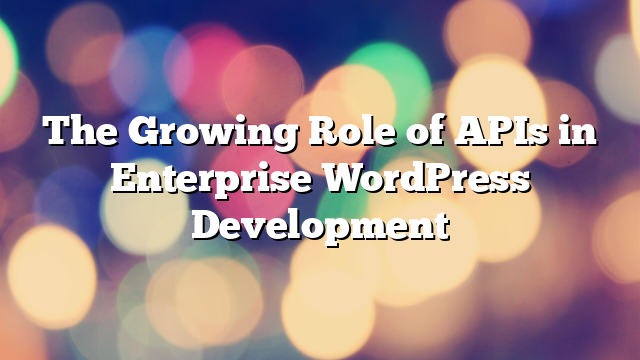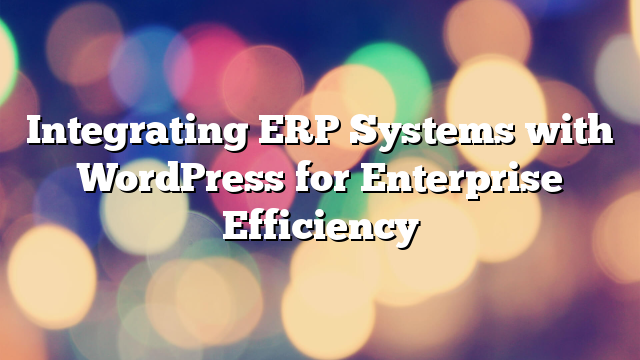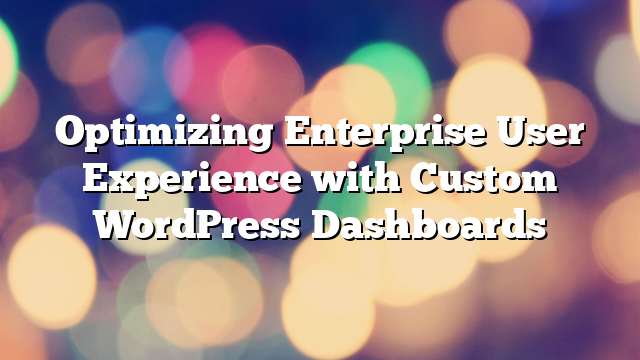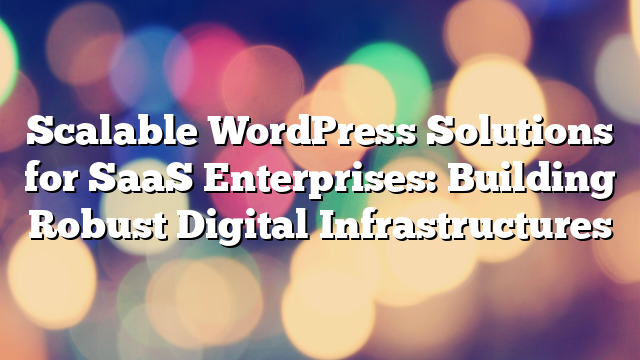The Growing Role of APIs in Enterprise WordPress Development
31.12.2024

APIs (Application Programming Interfaces) have revolutionized the way software systems interact, and their importance in enterprise WordPress development cannot be overstated. With the rise of headless CMS architectures, custom integrations, and dynamic data exchange, APIs are enabling businesses to build scalable, flexible, and feature-rich WordPress solutions. This article explores how APIs are transforming enterprise WordPress development and the best practices for leveraging them effectively.
What Are APIs and Why Do They Matter?
APIs are sets of rules that allow different software applications to communicate and share data. In the context of WordPress, APIs enable seamless integration between WordPress and external systems such as CRMs, marketing tools, e-commerce platforms, and more. For enterprises, APIs are key to building robust and interconnected digital ecosystems.
Key Benefits of APIs in WordPress Development
1. Enhanced Flexibility
APIs make it possible to use WordPress as a headless CMS, separating the content management backend from the frontend. This flexibility allows developers to use modern frameworks like React or Next.js to create highly interactive and dynamic user experiences.
2. Seamless Integrations
APIs enable WordPress to connect with third-party systems such as marketing automation tools, analytics platforms, and payment gateways. This interoperability helps enterprises create unified workflows and maximize operational efficiency.
3. Scalability
For enterprises managing large volumes of data or high-traffic websites, APIs facilitate efficient data exchange and scalability. By offloading certain tasks to external services, businesses can maintain optimal website performance.
4. Real-Time Data Access
APIs allow WordPress to fetch and display real-time data, such as stock prices, live event updates, or social media feeds. This capability enhances the user experience and keeps content fresh and relevant.
5. Custom Functionality
Enterprises can use APIs to extend WordPress functionalities, from advanced search engines to tailored customer portals. APIs provide the building blocks for creating bespoke features that meet specific business needs.
APIs Commonly Used in WordPress Development
1. WordPress REST API
The WordPress REST API is a powerful tool for accessing WordPress data programmatically. Developers can use it to retrieve, create, update, or delete content, making it essential for headless WordPress implementations and custom integrations.
2. GraphQL API
GraphQL is an alternative to REST that allows developers to query only the data they need, reducing unnecessary data transfer. It’s particularly useful for complex applications with multiple data sources.
3. Third-Party APIs
WordPress integrates seamlessly with numerous third-party APIs, such as Google Maps, Stripe, Salesforce, and Mailchimp. These APIs expand WordPress’s capabilities and allow enterprises to enhance their digital strategies.
4. Custom APIs
Enterprises can develop their own APIs to facilitate unique functionalities or connect proprietary systems to WordPress. Custom APIs ensure that WordPress integrates perfectly with internal workflows.
Use Cases for APIs in Enterprise WordPress Development
1. Headless WordPress
APIs are the backbone of headless WordPress setups, where the CMS handles content management while the frontend is built using modern JavaScript frameworks. This architecture is ideal for enterprises needing high performance and custom user experiences.
2. Multi-Platform Content Distribution
APIs allow enterprises to push content from WordPress to multiple platforms, such as mobile apps, social media, and partner websites. This capability ensures consistent messaging across all channels.
3. E-Commerce Integrations
By connecting WordPress with e-commerce platforms like WooCommerce or Shopify, APIs enable features like synchronized product catalogs, real-time inventory updates, and seamless checkout experiences.
4. CRM Synchronization
Enterprises can integrate WordPress with CRMs like Salesforce or HubSpot via APIs to track user behavior, manage leads, and automate marketing workflows.
5. Advanced Analytics
APIs facilitate integration with analytics platforms such as Google Analytics or Adobe Analytics, providing enterprises with deep insights into user behavior and site performance.
Best Practices for Using APIs in WordPress
1. Prioritize Security
APIs are potential entry points for malicious attacks. Use authentication methods like OAuth or API keys, implement SSL encryption, and validate all API requests and responses.
2. Optimize Performance
APIs can add latency to your website if not optimized. Use caching, minimize API calls, and ensure that APIs are built to handle the expected load.
3. Choose the Right API Type
Decide between REST, GraphQL, or custom APIs based on your project’s needs. While REST is versatile, GraphQL is better for fetching specific data efficiently.
4. Test Extensively
Test APIs thoroughly to identify and fix issues before deployment. Automated testing tools can help ensure API reliability and performance.
5. Document Your APIs
Comprehensive documentation is crucial for custom APIs, ensuring that developers understand how to use them effectively. Clear documentation reduces development time and errors.
Challenges of Using APIs in WordPress
1. Learning Curve
Understanding how to work with APIs, particularly in complex enterprise setups, can require significant time and expertise.
2. Compatibility Issues
Integrating multiple APIs can sometimes lead to compatibility conflicts. Proper planning and testing are essential to avoid disruptions.
3. Performance Overheads
APIs can strain server resources if not optimized, especially in high-traffic scenarios. Enterprises must invest in robust hosting solutions.
4. Maintenance
APIs, like any software component, require regular updates and maintenance to remain secure and functional.
Conclusion
APIs are a cornerstone of enterprise WordPress development, enabling seamless integrations, advanced customizations, and innovative solutions. By adopting best practices and leveraging the right APIs, businesses can unlock the full potential of their WordPress websites while ensuring scalability, security, and performance.
Ready to integrate APIs into your WordPress project? Contact AllWebDev today to explore how we can help build a connected and dynamic solution tailored to your enterprise needs!



